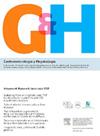巴西东北部一组炎症性肠病患者的焦虑和抑郁对生活质量的影响。
IF 2.2
4区 医学
Q3 GASTROENTEROLOGY & HEPATOLOGY
引用次数: 0
摘要
研究目的本研究旨在评估慢性病变与抑郁和/或焦虑症之间的关联是否会导致患者生活质量下降:这是一项前瞻性横断面研究,采用描述性和分析性设计。研究收集了社会人口学数据和生活习惯。随后,采用了炎症性肠病问卷(IBDQ)和医院焦虑抑郁量表(HADS)。结果 共有 141 名患者参与了研究,平均年龄为 45.78 岁(SD 16.01),其中女性占 60.3%(85 人),男性占 39.7%(56 人)。58.9%的患者患有溃疡性结肠炎(UC)(人数=83),41.1%的患者患有克罗恩病(CD)(人数=58)。16.5%的患者曾被诊断为广泛性焦虑症(GAD)和/或重度抑郁症(MD)(人数=23)。在 IBDQ 评分方面,患有焦虑症的参与者在所有 IBDQ 项目中的平均得分明显较低(p本文章由计算机程序翻译,如有差异,请以英文原文为准。
The impact of anxiety and depression on quality of life in a cohort of inflammatory bowel disease patients from Northeastern of Brazil
Objective
This study aims to assess whether the association between chronic pathologies and depressive and/or anxious disorders is high, resulting in a reduction in the patient's quality of life.
Patients and methods
This is a prospective cross-sectional study with a descriptive and analytical design. Sociodemographic data and lifestyle habits were collected. Subsequently, the Inflammatory Bowel Disease Questionnaire (IBDQ) and the Hospital Anxiety and Depression Scale (HADS) were applied.
Results
A total of 141 patients participated in the study, with a mean age of 45.78 (SD 16.01) years, of which 60.3% were female (n = 85) and 39.7% were male (n = 56). 58.9% had ulcerative colitis (UC) (n = 83), and 41.1% had Crohn's disease (CD) (n = 58). 16.5% of patients had a previous diagnosis of generalized anxiety disorder (GAD) and/or major depression (MD) (n = 23). Regarding IBDQ scores, participants with anxiety had significantly lower mean scores in all IBDQ items (p < 0.001), while the depression diagnosis obtained significantly lower mean values for systemic (p = 0.015), emotional (p = 0.001), and intestinal symptoms (p = 0.005).
Conclusion
The results indicate that anxiety and depression negatively impact the quality of life of patients with IBD independently of the disease activity.
求助全文
通过发布文献求助,成功后即可免费获取论文全文。
去求助
来源期刊

Gastroenterologia y hepatologia
GASTROENTEROLOGY & HEPATOLOGY-
CiteScore
1.50
自引率
10.50%
发文量
147
审稿时长
48 days
期刊介绍:
Gastroenterology and Hepatology is the first journal to cover the latest advances in pathology of the gastrointestinal tract, liver, pancreas, and bile ducts, making it an indispensable tool for gastroenterologists, hepatologists, internists and general practitioners.
 求助内容:
求助内容: 应助结果提醒方式:
应助结果提醒方式:


